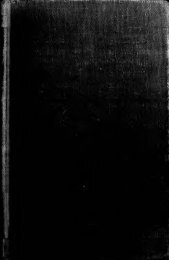Ecclesiastes - GA Barton - 1908.pdf
Ecclesiastes - GA Barton - 1908.pdf
Ecclesiastes - GA Barton - 1908.pdf
You also want an ePaper? Increase the reach of your titles
YUMPU automatically turns print PDFs into web optimized ePapers that Google loves.
REFLECTIONS ON DESPOTISM [CH.8'- 151<br />
Qoheleth illustrates the powerlessness of man to know the future<br />
by examples of his powerlessness in other respects. He cannot<br />
control the winds. The wind is one of God's grandest creations<br />
(Am. 4 13<br />
), and a symbol of his power (Na. i 3<br />
),<br />
4<br />
which is in his own hands (Pr. 3o ).<br />
the control of<br />
Nor is he ruler in the day of<br />
death}, a second example of man's powerlessness. Nor is there<br />
6 - 8<br />
This statement seems to contradict Dt. 2o<br />
furlough in war].<br />
25*. According to i Mac. 3 58<br />
Judas Maccabseus conformed to<br />
one of these laws. John Hyrcanus (135-104 B.C.) employed<br />
foreign mercenaries (cf. Jos. Ant. xiii, 8 4<br />
). No soldier in such<br />
ranks could obtain a discharge when his employer had a war on<br />
hand. Such mercenaries had been employed freely in Egypt<br />
from the time of the XXVIth dynasty (cf. Breasted's History<br />
of Egypt, p. 569 ff.}, and by the Persians in all periods of their<br />
history; so that it was in Qoheleth's day no new thing. The<br />
allusion is probably to such soldiers, and thus becomes a third<br />
illustration of Qoheleth's point. 9. All this I have seeri\,t\\e power<br />
of the despot described in vvs. 1-8. Applied my heart to all the<br />
work], thoughtfully considered, or investigated. When man has<br />
power over man to his hurt]. This is an apt description of the in-<br />
justices of an Oriental despotism. Such injustice has existed<br />
under every Oriental monarchy, the allusion accordingly affords<br />
no clue to the date.<br />
" To his hurt " is ambiguous. (&, & and ,<br />
which are followed by Kn., Gins., Z6., Del. and Wild., make it<br />
refer to the second man. 2 and Hitzig and Ha. take it to refer<br />
to the first man. The first of these views is the correct one. The<br />
retribution to which allusion is made at the end of vs. 9 is often<br />
delayed, and meantime the subjects of the tyrant suffer.<br />
8 l . oonna] for the more common DSHD. The full writing of the article<br />
occurs not infrequently in later Hebrew, cf. Ges. K -<br />
3Sn. ~^o], an<br />
Aram, loan word, occurring only here in BH., but frequently in Aram.<br />
(cf. Dn. 2 4 - 5 - 6 - 7 - 9 - 16 - 24 - 25 - 26 - 30 - 36 45 4 - 6 - 15 - 16 - 21<br />
A s 12 - 16 , etc. "'3"'] here<br />
= " thing," "matter," as in i 8 8 and .<br />
7 I^D "^n], cf. Nu. 6 25 Ps. 4*<br />
Job 29 2< Pr. i6 15 25<br />
and BS. I3 (Heb.) for -\w with O'rp, Ps. 199. D'JD Tj?].<br />
The Versions read T>? the adj., not tj? the noun. This should be<br />
adopted. It is used of "shamelessness," "impudence,"<br />
ness," cf. Dt. 2850 Pr. 7 13 2i Dn. 8 23 . N.4&"]<br />
verbs are often confused in the later books, cf. Ges.K-<br />
or "coarse-<br />
for n:\ N"S and n'"><br />
75rr and 2 K.





